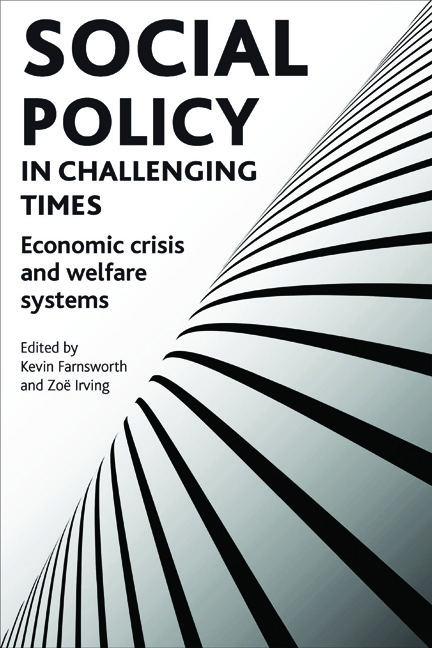Book contents
- Frontmatter
- Contents
- List of figures and tables
- Notes on contributors
- Acknowledgements
- one Varieties of crisis
- two The economic crisis and paradigm change
- three From financial crisis to fiscal crisis
- four Credit crunch, inequality and social policy
- five Global social policy responses to the economic crisis
- six Poverty, the crisis and social policy responses developing countries in developing countries
- seven South Korea after the 1997 economic crisis: a ‘paradigm shift’?
- eight China's response to crisis: what role for social policy?
- nine Tiptoeing through crisis? Re-evaluating the German social model in light of the global recession
- ten Ireland and the impact of the economic crisis: upholding the dominant policy paradigm
- eleven Waving not drowning: Iceland, kreppan and alternative social policy futures
- twelve Experiences from two financial crises in the Nordic welfare states: 1990-93 and 2008-10 compared
- thirteen Social policy and the recent economic crisis in Canada and the United States
- fourteen From economic crisis to a new age of austerity: the UK
- fifteen Responding to the challenges: some concluding remarks on welfare futures in changed circumstances
- Bibliography
- Index
ten - Ireland and the impact of the economic crisis: upholding the dominant policy paradigm
Published online by Cambridge University Press: 07 September 2022
- Frontmatter
- Contents
- List of figures and tables
- Notes on contributors
- Acknowledgements
- one Varieties of crisis
- two The economic crisis and paradigm change
- three From financial crisis to fiscal crisis
- four Credit crunch, inequality and social policy
- five Global social policy responses to the economic crisis
- six Poverty, the crisis and social policy responses developing countries in developing countries
- seven South Korea after the 1997 economic crisis: a ‘paradigm shift’?
- eight China's response to crisis: what role for social policy?
- nine Tiptoeing through crisis? Re-evaluating the German social model in light of the global recession
- ten Ireland and the impact of the economic crisis: upholding the dominant policy paradigm
- eleven Waving not drowning: Iceland, kreppan and alternative social policy futures
- twelve Experiences from two financial crises in the Nordic welfare states: 1990-93 and 2008-10 compared
- thirteen Social policy and the recent economic crisis in Canada and the United States
- fourteen From economic crisis to a new age of austerity: the UK
- fifteen Responding to the challenges: some concluding remarks on welfare futures in changed circumstances
- Bibliography
- Index
Summary
Introduction
Ireland represents one of the more extreme cases of economic damage in the global economic crisis. The country became the first in the euro area to enter recession and, over the period 2008 to 2010, Gross Domestic Product (GDP) declined by about 11%. Ireland's banking crisis is, along with Iceland’s, one of the largest of the advanced economies and the country also had the largest current deficit in the European Union (EU) by 2010. This situation poses near-impossible challenges and severe economic and social hardship. Such a rupture from the previous decade of high growth, for which Ireland was feted as a paradigm case of embracing neoliberal globalisation, would suggest potential for serious questioning of the model pursued and the level of economic and social risks it engendered. Perhaps paradoxically, however, the policy response to the Irish crisis has been characterised by a rapid and severe turn to austerity, with alternative proposals for economic recovery so far gaining little ground. While fundamental questions have been asked about the model of economic development pursued during the boom years, this has not translated into any radically different proposals in mainstream political discourse about how this might change. Instead, the idea that there is no alternative to the current policy trajectory weighed heavily in the debate as the crisis unfolded, and the EU/International Monetary Fund (IMF) loan deal agreed in late 2010 has further re-enforced the policy response of austerity and retrenchment.
Given this set of observations, this chapter aims to document the economic crisis and examine why, although the severity of the economic crisis might represent the conditions for what Hall (1993) describes as a third order change (when the dominant paradigm is challenged and changed to the extent that a paradigm shift occurs), there is little evidence of this occurring in the Irish case. As of late 2010, the crisis in Ireland remained far from resolved and in this climate, shifts can be difficult to confirm, being more easily identified after the event (see also Hill, this volume).
- Type
- Chapter
- Information
- Social Policy in Challenging TimesEconomic Crisis and Welfare Systems, pp. 181 - 198Publisher: Bristol University PressPrint publication year: 2011



